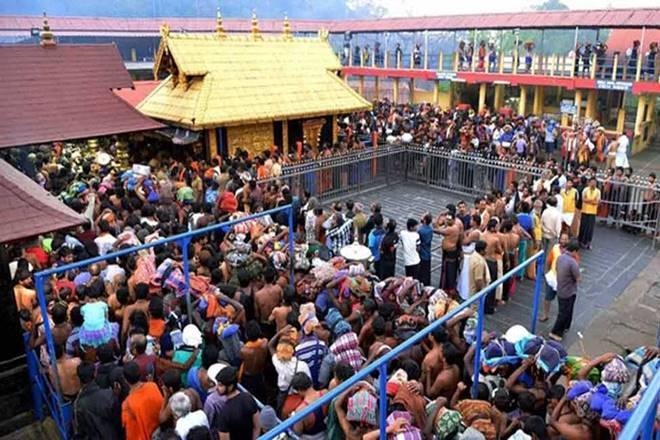New Delhi: The Supreme Court Monday made clear that it was not hearing pleas seeking review of a 2018 judgement allowing women and girls of all ages to enter Kerala’s Sabarimala temple and would rather deal with larger issues, including the extent to which the courts can intervene in “particular religious practices”.
A nine-judge Constitution bench headed by Chief Justice SA Bobde at the outset said that it will only deal with the issues referred to it by a five-judge bench November 14 in the Sabarimala case, and asked the lawyers to convene a meeting January 17 to decide on “re-framing” or adding additional issues to be deliberated upon by it.
“We are not hearing review pleas of Sabarimala case. We are considering issues referred to by a 5-judge bench earlier,” the bench said.
It said that though it may not decide them, but it will order listing of petitions related to entry of Muslim women into mosques, female genital mutilation in the Dawoodi Bohra Muslim community and barring of Parsi women, married to non-Parsi men, from the holy fire place at Agiary.
Besides the CJI, the bench comprises Justices R Banumathi, Ashok Bhushan, L Nageswara Rao, MM Shantanagoudar, S Abdul Nazeer, R Subhash Reddy, BR Gavai and Surya Kant.
The bench said the apex court secretary general will coordinate with the four senior advocates, including Solicitor General Tushar Mehta and AM Singhvi, in thrashing out the issues to be dealt by it.
The lawyers will decide “whether any of the issues (framed by the court earlier) needed to be re-framed or added and in what manner,” it said.
The meeting should also deal with the time to be allotted to each lawyer for advancing arguments in the case, it added.
The bench said the lawyers should decide who will address which issue and fixed the matter for further hearing after three weeks and also lauded the efforts of senior advocates CS Vaidyanathan and Rajeev Dhavan which led to smooth hearing in the Ayodhya case.
“We will grant three weeks’ time for this (deciding the issues) and we will put this matter after that for hearing,” it further said.
The bench took note of submissions of a battery of senior lawyers including K Parasaran, Rajeev Dhavan, Singhvi, Indira Jaising, V Giri, CA Sundaram and asked them to take part in the meeting to thrash out the larger issues, including discrimination against women in various religions and the scope of judicial intervention in matters of religious issues.
Jaising said that without holding that the Sabarimala judgement was wrong, the matter cannot be referred to a larger bench and moreover, the seven-judge bench judgement in the Shirur Mutt case has not been doubted or assailed to justify a reference to the nine-judge bench.
Singhvi, appearing for the Travancore Devaswom Board and some of the litigants in FGM case, submitted that the issues have been framed very ‘broadly’ by the earlier bench, despite the best of the intentions.
The solicitor general also agreed with Singhvi and said that the seven issues referred to by the earlier bench needed some “fine-tuning”.
A five-judge bench headed by the then CJI Ranjan Gogoi, by a majority of 3:2, had referred seven issues for consideration of the larger bench.
They included — interplay between freedom of religion under Articles 25 and 26 of the Constitution; need to delineate the expression ‘constitutional morality’; the extent to which courts can enquire into particular religious practices; meaning of sections of Hindus under Article 25 and whether ‘essential religious practices’ of denomination or a section thereof are protected under Article 26.
Another question was the “permissible extent of judicial recognition to PILs in matters calling into question religious practices of a denomination or a section thereof at the instance of persons who do not belong to such religious denomination”.
The top court had said, “The subject review petitions as well as the writ petitions may, accordingly, remain pending until determination of the questions indicated above by a larger bench as may be constituted by the Chief Justice of India.”
The majority verdict had said that the debate about the constitutional validity of religious practices like bar on entry of women and girls into a place of worship was not limited to the Sabarimala case.
It had said that such restrictions were there with regard to entry of Muslim women into mosques and ‘dargah’ and Parsi women, married to non-Parsi men, being barred from the holy fire place of an Agyari.
The bench had added that time has come when the apex court evolves a judicial policy to do “substantial and complete justice” in such matters.
PTI
